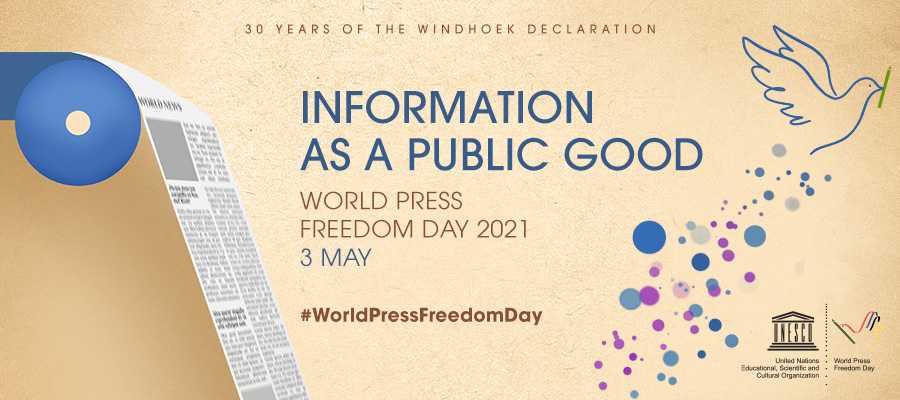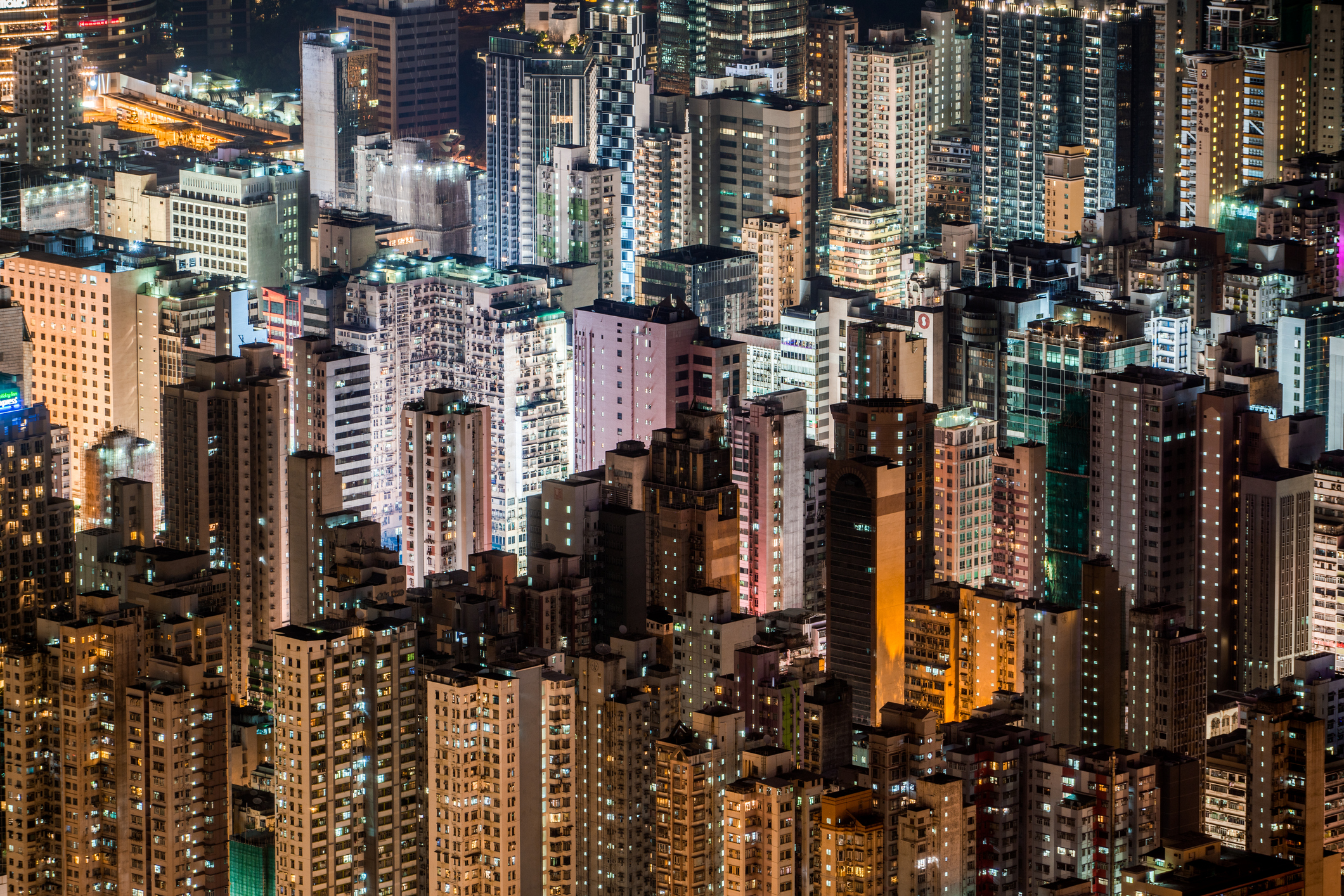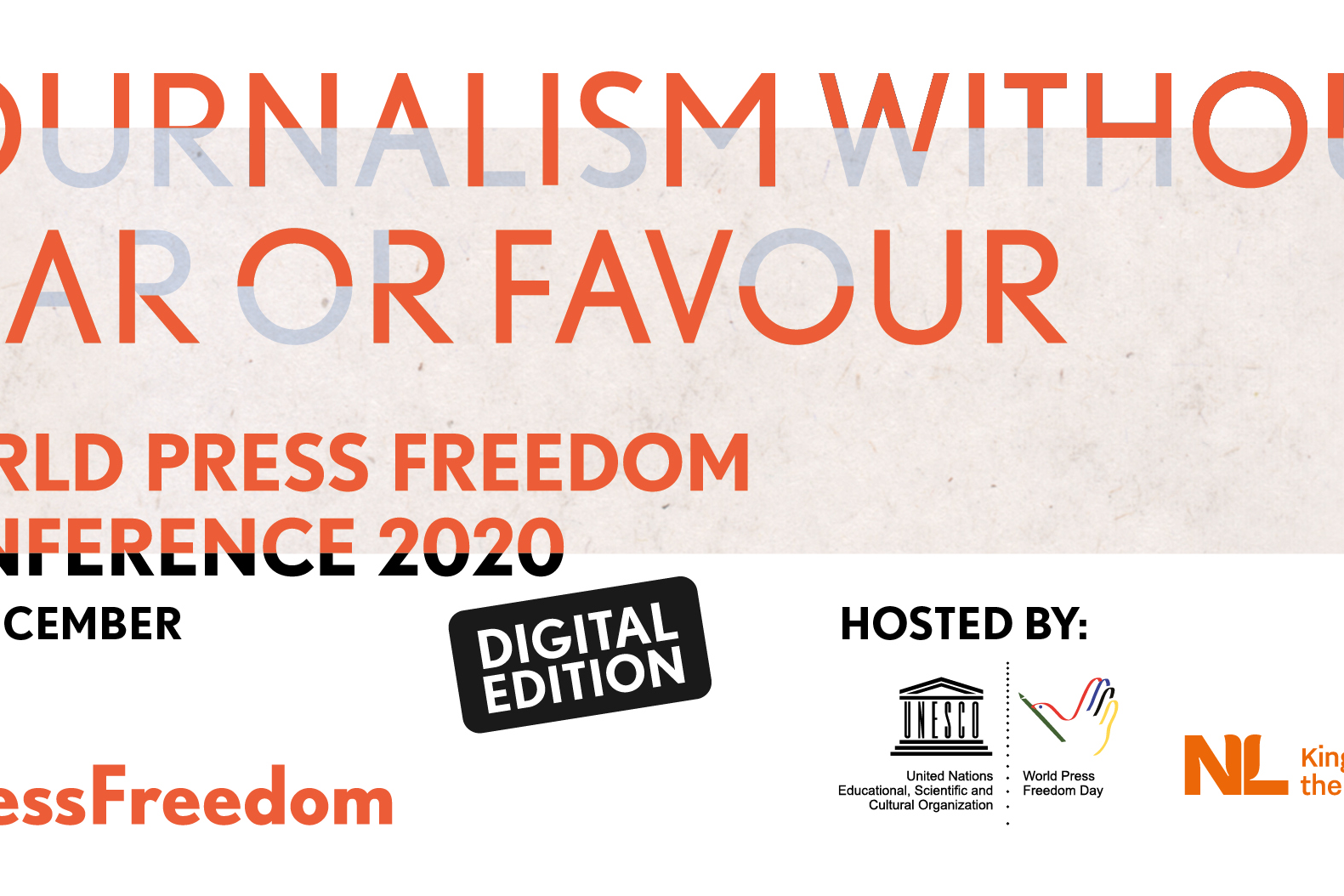GLOBAL CALL OUT
“Information as a public good” might be the theme for this year’s WPFD, but around the world attacks on independent media mean that access to accurate and trusted sources of information is seriously under threat.
Independence is at the heart of public service media (PSM). As publicly funded organisations they should be free from undue political and commercial interference, particularly in editorial decision making. This enables public media workers and journalists to effectively hold power to account on behalf of the public and provide a broad range of content to inform, educate and entertain diverse audiences.
No more so than during a global pandemic, has media independence been so important nor more necessary.
It’s a useful reminder then, that media independence – alongside the development of a free and pluralistic press – is at the heart of the Windhoek Declaration, which celebrates its 30th anniversary this WPFD. The declaration sets parameters for states to be proactive in ensuring journalist safety and avoiding control of the media.
But in this 30th year, the threats facing media independence have rarely been greater and on such a global scale. In many places, it has been diminished to a mere and distant ideal. While there have long been attempts to undermine the independence of public media organisations by powerful groups, corporations and politicians with an eye to steer the course of public debate, it seems that COVID-19 has offered a cloak under which these forces can double down on their ambitions at a time when easy access to trusted information is needed most.
COVID-19 has offered a cloak under which these forces can double down on their ambitions
This past year has been catastrophic for press freedom and public access to information. In the latest World Press Freedom Index, Reporters without Borders (RSF) state that journalism has been “completely or partly blocked in 73%” of the 180 countries ranked, while the International Press Institute’s (IPI) COVID-19 Press Freedom Tracker has recorded more than 600 COVID-related press freedom violations globally since February 2020.
PMA has seen a rise in targeted attacks, harassment – particularly of women journalists – and arbitrary arrests of media workers as well as a significant growth in media capture by states. The past year also bore witness to the rise of global Black Lives Matter rallies and pro-democracy protests in Hong Kong and Belarus, which saw news media and their staff repeatedly attacked by authorities for simply doing their jobs.
Between 26 May and 23 November 2020, there were a total of 327 press freedom violations against reporters covering the protests that followed the death of George Floyd in the US alone. Such incidents can inspire self-censorship by individual reporters, the cumulative effect of which can cripple the ability of news media – especially smaller outlets – to effectively report on matters of public interest.
75% of women surveyed experienced online abuse
Threats to journalist safety have also come from the public at a time when trust in news media is falling. A recent UNESCO/ICFJ survey of 900 female journalists revealed that nearly 75% of those surveyed experienced online abuse, while a quarter faced physical threats. Across Europe, journalists have been targeted by far-right groups and during anti-lockdown protests. The threat is so real that some outlets, like NOS in the Netherlands, removed their logos from work vehicles for fear of attack. Austria’s public broadcaster ORF has adopted similar policies.
Since WPFD 2020, we’ve witnessed a significant growth in the use of systemic and structural means to steer narratives and stymie the flow of information to the public. In Pakistan, the arbitrary arrest of Geo Editor-in-Chief, Mir Shakil Rahman, over a 30-year-old property dispute led to 200 days detention. Geo is known for being critical of Pakistan’s Army and government. We’ve also seen a resurgence in the use of oppressive laws and regulations, such as the use of SLAPPs (Strategic Lawsuits Against Public Participation) against critical journalists in Croatia, or the imposition of so-called “fake news” laws – like those in Bangladesh, Brazil and Malaysia – to sanction, suspend or even shut independent media for reporting that is deemed untrue by ruling elites. Similar steps were taken to suspend the Philippines’ largest broadcaster ABS-CBN last year.
Even regulators and councils that are designed, in part, to shore up and further protect the independence of public media are being routinely compromised. Readers would only need to look to recent attempts to politicise the Czech TV Council, which oversee the public broadcaster’s activities, or the deeply concerning rumours as to who the UK government will appoint as Chair of broadcast regulator Ofcom. Both have the potential to undermine the role of independent public interest media.
Even regulators and councils that are designed, in part, to shore up and further protect the independence of public media are being routinely compromised.
And then there’s media capture – where premeditated action is taken to monopolise and control media groups by states and state-backed groups. PMA frequently reports on the demise of pluralism in Poland and Hungary. Since 2015, the Polish public broadcaster TVP has effectively been transformed into a mouthpiece of the state by the ruling Law & Justice party, and the situation is only getting worse. Just this week a purge of editors began at Polska Press despite a court ruling that suspended its purchase by state-controlled oil company PKN Orlen.
Yet it is Hong Kong that has experienced among the most brazen attacks on media independence amid Beijing’s consolidation of power over the region. The imposition of new national security laws has been used to clampdown on pro-democracy supporters and has sent a chill through many independent outlets. Hong Kong’s public broadcaster, RTHK, is one of them. Despite having a tradition of editorial independence, the past year has seen its journalists arrested and management replaced with bureaucrats linked to the state. There are fears here too that the national security law will be used to clampdown on alleged “fake news” and further limit the ability of journalists to critically hold power to account.
While this is by no means a comprehensive account of press freedom violations, it offers a snapshot of the disturbing situation facing public and other independent media. And much like the pandemic, these threats are truly global and at times, insidious. Despite there being many obvious ways of limiting the flow of information, the dominance of COVID-19 has allowed many press freedom violations to become more pervasive and appear to emerge suddenly. Effective responses to the pandemic require an informed public, who in turn require facts and the knowledge that power is being held to account. Now more than ever, a protected, free and effective press is needed to both tackle mis- and disinformation and ensure that responses to the crisis are adequate.
This World Press Freedom Day, PMA calls on authorities and governments around the world to protect and support press freedom and media independence, not only for the health of democracy, but also for the health of the public.
Country by Country
Click on the countries below to find out about critical press freedom and media independence challenges in more detail
BRAZIL
Dismantling public media
The deteriorating situation facing media in Brazil is noteworthy: not only did the Latin American country remain an extremely violent media environment due to threats, SLAPPs, harassment, and hostilities, but COVID-19 dis- and misinformation threatened factual, independent journalism and made media workers the target of anti-media rhetoric and attacks. Worse yet, misinformation was often fuelled by Brazilian President Jair Bolsonaro, who targeted journalists with “fake news” regulations that impacted media freedom and drove self-censorship. In 2020, Brazilian journalists were the victims of more than 500 attacks.
In the background of these media freedom concerns is the degradation of public broadcaster, Empresa Brasil de Comunicação (EBC). EBC was created as a model of independent and accountable media but has been dismantled and transformed in recent years into a government mouthpiece, beginning with a restructuring that saw the dismissal of its Board of Trustees and the removal of mechanisms that safeguarded its independence.
Now, EBC is under threat of privatisation. There has been considerable pushback from organisations such as Frente em Defesa da EBC e da Comunicação Pública (Front for the Defence of EBC and Public Broadcasting) and FICA EBC against the political rhetoric labelling EBC as a burden and the message of the need for privatisation. Both groups maintain the importance of independent public media and deem its deterioration as further attempt to muzzle news media outlets.
Read more: Brazil: Privatisation of public media looms
CZECH REPUBLIC
Attempts to politicise public media
Recent developments at Czech TV (Česká Televize, ČT) demonstrate further attempts by the Czech Republic’s ruling ANO party to politicise the public broadcaster and undermine its independence.
Concerns have grown following the announcement of a shortlist for future members of the CT Council – the governing body responsible for appointing the organisation’s Director-General, overseeing its budget and managing its activities. Some have close affiliations with the ANO party, and some are known critics of Petr Dvořák, CT’s Director-General. Recent allegations by a current Council member regarding a conflict of interest between Czech TV and an IT training company with shares owned by Dvořák, were unfounded. If this were the case, it could have provided grounds for Dvořák’s dismissal.
Despite Czech TV being among the most trusted and most viewed news outlets in the country, media ownership is increasingly concentrated and has led to declining levels of public trust and credibility in the media overall. The blurring of lines between business, politics and independent media in the Czech Republic was a key finding in a recent report published by the Ethical Journalism Network.
Last month, The Global Task Force for Public Media (GTF) published a statement urging Czech leaders “across media, business and culture to speak out in support of independent media” and for governments of the Media Freedom Coalition to “consider the developments in the Czech Republic in the light of the Coalition’s communique in December 2020.”
A parliamentary election is due to take place in October. But in order for the process to take place democratically, independent media must be allowed to provide trusted news and coverage – free from political or financial interference – in the lead up to and during the election period.
Read more:
PMA condemns attempts to undermine the independence of Czech TV
HONG KONG
Stifling independent and public media
One year has warped the Hong Kong media landscape beyond recognition. The June 2020 National Security Law and the COVID-19 pandemic hit independent media hard, with growing influence from Beijing; the repression of free speech under the shroud of the pandemic; and media accreditation rules that disenfranchised countless journalists.
Hong Kong’s traditionally independent public broadcaster RTHK has also changed. From being cautioned about interviewing pro-democracy figures arrested in unprecedented raids, to the conviction of journalist Bao Choy, RTHK journalists faced an atmosphere of growing self-censorship. They have also experienced unexplained programme cuts and the addition of bureaucrats to the broadcaster’s management, including their new Director of Broadcasting, Patrick Li, a career civil servant with no journalistic experience. Li’s controversial decisions were commended by Chief Executive, Carrie Lam, who said he is doing exactly what is expected of RTHK’s head.
Unfortunately, the future seems bleak for Hong Kong’s public and independent media. RTHK had its funding cut in the 2021-22 budget, and is said to be in a “transition period” as it reviews all aspects of its operations and prepares for an overhaul. Meanwhile, in the wider landscape, journalists are braced for a further onslaught. The Hong Kong Police Force has warned that the security law could be used to tackle “fake news”; a journalist has already been arrested on an identical charge to Bao Choy’s; and Apple Daily owner Jimmy Lai was sentenced to 14 months in prison and slapped with a new charge under the National Security Law.
INDIA
Restricted access to information during the COVID-19 crisis
Access to information is essential in a country such as highly populated as India. But this essential public good has been restricted at a time when the Indian population – currently battling a horrific second COVID-19 wave – needs it most.
Several reports and journalists’ accounts reveal the Indian government’s lack of transparency in recording the number of COVID-19 cases and the reality of the crisis. With criticism towards the government’s handling of the pandemic continuing to grow, this lack of transparency has transcended onto online platforms as authorities respond by blocking critical tweets and other content. Earlier this year the government also increased pressure on independent online journalism by introducing wide-ranging digital media laws that would effectively enable them to censor online news content with little appeal.
The public health and information crisis is taking place in the backdrop of ongoing geopolitical tensions. As conflict persists in the territories of Jammu and Kashmir, which were stripped of their special autonomous statuses in August 2019, journalists have been met with draconian measures including being advised by police against reporting on “encounter sites” with militants.
Other reports reveal that restructuring plans for India’s national public broadcaster, Prasar Bharati (PB), are under consideration. Possible changes include reducing technical staff and increasing its content-making capacity. It is worth noting that PB’s radio arm, All India Radio (AIR), has a monopoly over radio news, which has serious implications for pluralism across the country’s most accessible media format.
MYANMAR
Journalist safety, diminished access to information and a complete erosion of independent media
Since the military coup on 1 February, independent media have faced chilling levels of intimidation. The military and police have imposed strict clampdowns on media freedom; journalists have been attacked while covering protests; more than 70 journalists have been arrested; five privately-owned news stations have been suspended, and internet access continues to be restricted – further limiting access to information. In a further move, the military began publishing a list of “wanted” journalists who are considered to be spreading news to harm “state stability.” State-controlled national broadcaster, Myanmar Radio and Television (MRTV), also reportedly threatened demonstrators, warning that “action” would be taken against anyone found breaking the law.
Many media freedom advocates note that these incidents undo a lot of the progress made to improve press freedom in recent years.
The Media Freedom Coalition issued a statement expressing deep concern over the media clampdown in Myanmar: “Independent reporting is all the more important in the current context, helping to counter the disinformation campaigns in Myanmar, both online and offline, and to provide the public with factual accounts of events taking place in the country…”
The MFC calls for the end to all internet restrictions; to cease attacks on media workers and release those arbitrarily detained with immediate effect; that perpetrators of media freedom violations are held accountable, and that the military respects “the media’s freedom to report protests independently, safely and without fear of violence or arbitrary detention.”
POLAND
Media pluralism and financial independence at stake
From the state capture of public media to growing levels of media concentration, the pressure on Poland’s remaining independent media has been mounting in recent years. A government proposal to introduce a new advertising tax – under the pretext of supporting healthcare during the COVID-19 pandemic – is the latest in a long line of measures that could have an irreversible impact on the plurality and financial independence of privately-owned media. For some this could mean complete closure with little chance of opening up again, especially considering the additional financial impact of COVID-19.
One move in favour of protecting independent media emerged recently when a court in Warsaw decided to temporarily suspend the purchase of Polska Press – one of the country’s largest media companies – by state-owned and government-affiliated oil company, Orlen. But this reprise has been short-lived. Since then, Orlen has undertaken a ‘purge’ of Polska Press editors, including the replacement of its CEO. There are fears that replacements will be politically motivated supporters of the ruling Law and Justice (PiS) party.
This erosion of media independence has led to media freedom and human rights groups calling on the European Parliament to intervene and take more robust, tangible action against the growing clampdown on independent media in Poland.
Read more:
Poland: Advertising tax poses existential threats to independent media
Poland: Media independence and pluralism under threat from state-backed companies
Header Image: This transmission electron microscope image shows SARS-CoV-2—also known as 2019-nCoV, the virus that causes COVID-19—isolated from a patient in the U.S. Credit: NIAID-RML/Creative Commons
Related Posts
26th April 2021
Crisis facing independent journalism in Hong Kong escalates
Troubling times ahead for Hong Kong's…
19th April 2021
Lifting sanctions on Tanzania’s media: a limited turning point?
New administration takes limited steps…
23rd September 2020
Call Out: COVID-19 compounds risks to public media and their critical role in democracy
Independent public media and public…




